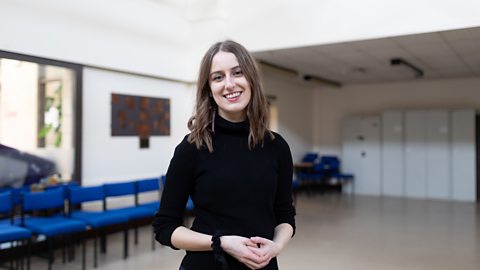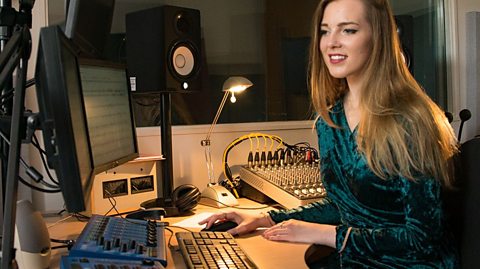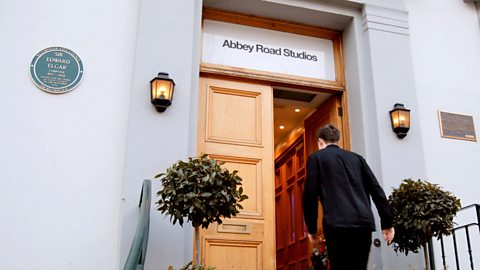Meet Isabel. She's 24 and lives in Cardiff. Find out about her job as a musician and music teacher. Part of our Bitesize world of work series.

With performing, you make a name for yourself by just doing and pushing yourself to develop your skills.
How would you describe your job?
I do loads of different things, all to do with music. I teach private piano lessons, and conduct two choirs – one is made up of 60 adults and the other is a group of carers.
I also play in different live bands for events, like weddings.

What route did you take to get to where you are today?
I've taken piano lessons since I was 8. I chose Music at GCSE and continued it through to A-level. I completed my grades in singing and piano, and then applied to university. I did an undergraduate degree in Music and then a master's degree in Music, Culture, and Politics.
I started conducting choirs when I was 15, set up my own choir when I was 16, and then carried on throughout university.
When I was 18, my piano teacher said she would help train me up to become a teacher myself. I've increased my number of pupils since then through various contacts and recommendations.

Have you faced any challenges in your job?
The main challenge is time. You have to give up your weekends and evenings, on top of working throughout the week. It also takes a good few years to build up a name for yourself and get a reputation, so for a while you can do a lot of hours and not make a lot of money, but it's worth it to be doing something you love.

Top tips
- Trust your instincts. People may tell you not to go into music because of misconceptions, but if you are good at it and hard-working, it is possible
- If you're interested in music, start by giving it a go
- Keep developing your skills. In addition to taking lesson, there are so many brilliant online tutorials that you an use to learn music. Make use of them
- Be prepared to diversify your skills. While you might make a whole career from being a pro violinist, for example, it's more likely you'll also need to teach, conduct, write, run workshops, work with charities, compose or organise events to supplement your income.

What to expect if you want to be a musician
- Musician average salary: Variable.
- Musician typical working hours: 34 to 36 hours per week. Be prepared for long and unsociable hours at times.
What qualifications do you need to be a musician?
You could get into this role via a university course, a college course, applying directly or specialist courses run by private training organisations.
Sources: LMI for All, National Careers Service
This information is a guide and is constantly changing. Please check the National Careers Service website for the latest information and all the qualifications needed.
For careers advice in all parts of the UK visit: National Careers Service (England), nidirect (Northern Ireland), My World of Work (Scotland) and Careers Wales (Wales).

Work experience in your area
Find work experience placements with Workfinder.
Tips and advice
Help with interviews, writing a CV and all things work experience related.

Grace: composer
Grace uses computers to help her write music.

Rachel: dancer and choreographer. video
Rachel uses her knowledge of the body to teach people how to dance.

Jack: digital marketing assistant. video
Jack works at the famous Abbey Road Studios in London.
